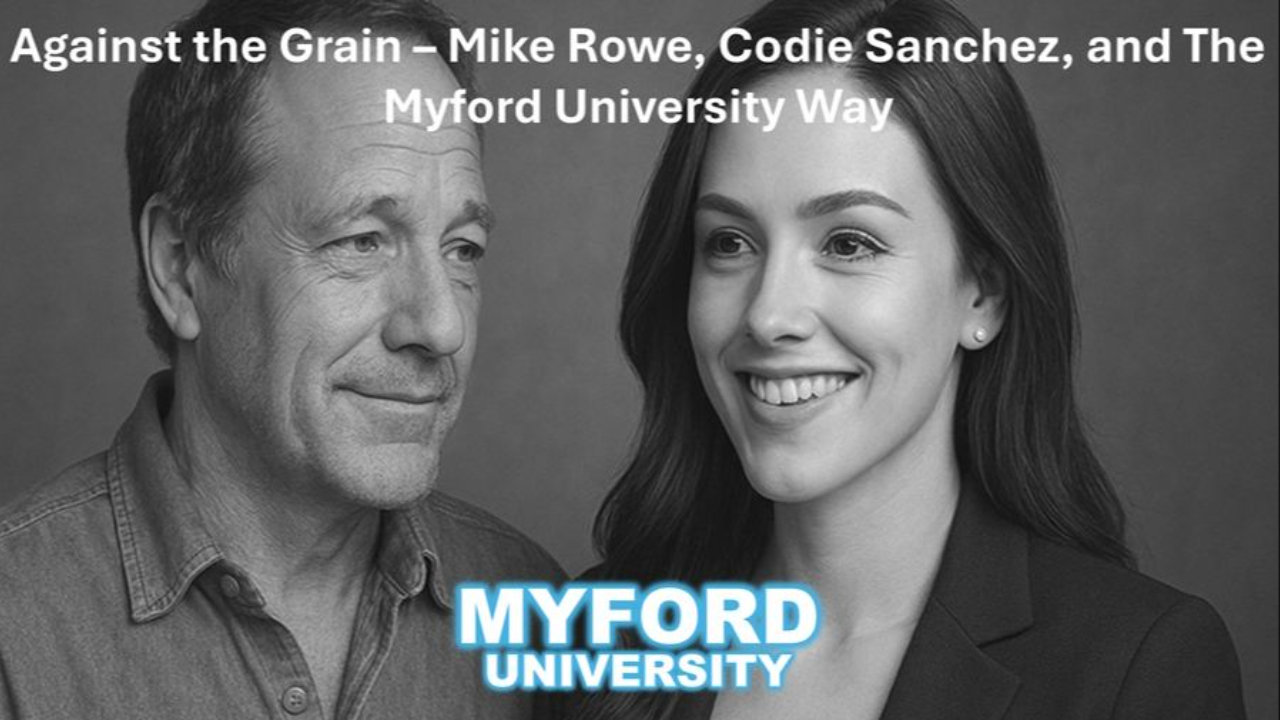Against the Grain: Why I Believe in Mike Rowe, Codie Sanchez, and the Myford University Way
Oct 07, 2025
I’ve always gone against the grain.
It’s in my nature not to accept things at face value, not to swallow the conventional wisdom simply because that’s what everyone else is doing. Groupthink never sat well with me. I’ve always believed that if the herd is moving in one direction, it’s worth pausing, stepping aside, and asking: is this really the right path—or just the most crowded one?
That attitude has shaped the way I view higher education. For decades, the default narrative has been that success equals college, then maybe a graduate degree, then hopefully a stable job. But when I look at the landscape today—the debt, the wasted years, the mismatch between what colleges teach and what employers actually need—it’s impossible for me not to conclude that the system is broken. Worse, it’s trapping millions of people in an unwinnable game.
That’s why I’m drawn to people who also defy convention and offer real alternatives. Two in particular stand out: Mike Rowe and Codie Sanchez. Rowe has spent years championing the dignity of skilled trades at a time when society undervalues them. Sanchez has built an entire movement around buying “boring” small businesses instead of chasing glamorous startups. Both have carved out paths that are practical, profitable, and radically different from the traditional higher-ed conveyor belt.
In this article, I want to explore their approaches—not as a fanboy, but as someone who sees enormous value in what they’re saying and also wants to add another complementary path: what I’m building with Myford University. Knowledge, skills, and fast application—that’s our game. And when you put it next to Rowe’s trades and Sanchez’s boring businesses, you start to see an ecosystem of alternatives that makes the four-year degree look less like the only way forward and more like one of many options—often the least efficient one.
Mike Rowe and the Dignity of Work
Let me start with Mike Rowe. Most people know him from Dirty Jobs, where he rolled up his sleeves and did everything from cleaning sewers to castrating lambs. The show was entertaining, sure, but it carried a deeper message: these “dirty” jobs are essential. They make civilization run. They’re often well-paying. And yet, we as a culture had stopped respecting them.
Rowe saw a gap between perception and reality. On one side, kids were being told from middle school onward that the only respectable path was college. On the other, employers in construction, plumbing, electrical work, welding, and other trades were desperate for workers. The jobs existed, they paid solid wages, but the talent pipeline had dried up.
Instead of shrugging, Rowe built something. Through the mikeroweWORKS Foundation, he created scholarships and training programs to get people into the trades. He attached it to his “S.W.E.A.T. Pledge”—Skill and Work Ethic Aren’t Taboo—a code of personal responsibility that makes clear this isn’t just about handing out checks. It’s about cultivating a mindset. If you want a scholarship, you have to film a short video, get references, sign the pledge, and show you’re serious. It weeds out the dabblers and highlights those who are genuinely committed.
I admire that because it echoes my own philosophy: don’t just accumulate paper credentials—prove your value with real skills, work ethic, and output. Rowe is essentially saying, “Let’s invest in people who will actually do the work, not just sit in classrooms for four years.”
And it’s working. His foundation has given out millions in scholarships. His work ethic curriculum has been adopted in schools and companies. And perhaps most importantly, he has helped restore a sense of pride to jobs that too often get dismissed as second-class.
Now, I’m not blind to the trade-offs. Some of these jobs are physically demanding. They can carry injury risks. They can require geographic mobility—work is where the projects are, not necessarily where you want to live. But those downsides don’t erase the core truth: the trades offer a faster, cheaper, and more reliable path to good earnings than most college degrees today. For someone who doesn’t want to spend four years in lecture halls, this is a compelling option.
Codie Sanchez and the Case for Boring Businesses
If Mike Rowe is the champion of the trades, Codie Sanchez is the evangelist of boring businesses.
While everyone else was glamorizing Silicon Valley startups, chasing venture capital, and idolizing tech unicorns, Sanchez was making a contrarian argument: why not buy a small business that already works? Why not skip the garage-phase, skip the pitch decks, skip the “maybe someday it’ll be profitable” gamble—and instead take over a laundromat, a car wash, a vending route, or an HVAC company that already has customers, cash flow, and staff?
On the surface, it’s not sexy. In fact, that’s the point. She calls them “boring businesses” because they don’t make headlines, they don’t trend on Twitter, and they don’t get you invited to speak at startup conferences. But they do one thing exceptionally well: generate cash.
I think that message resonates because it cuts through the illusion of entrepreneurship as endless pitch decks and hustle porn. The truth is, most startups fail. Most VC-backed companies never return capital. But boring businesses? They’re everywhere. They’re stable. They’re often run by aging owners who are ready to retire but don’t have a succession plan. That creates a buyer’s market for the younger, hungrier operator who’s willing to step in.
Sanchez has taken this message and scaled it through her Contrarian Thinking platform. She publishes newsletters, runs courses, builds communities, and constantly shares deal breakdowns to show people how to evaluate and operate these businesses. She talks about seller financing, SBA loans, and creative structures that make acquisitions accessible without millions in the bank. She demystifies the process and makes it feel possible.
Now, as with Rowe, there are caveats. Running a small business isn’t passive income. It’s not just “buy it and chill on the beach.” It’s messy. It requires leadership, systems, hiring, firing, marketing, and finance. Get it wrong and you can sink fast—especially if you over-leverage with too much debt. But the upside is undeniable: if you get it right, you can replace a salary almost immediately and build wealth far faster than climbing the corporate ladder.
I give Sanchez a little more weight here because I think her message is newer, and in many ways, more urgently needed. The “silver tsunami” of retiring business owners is real. Millions of small businesses will change hands in the coming decade. If young people don’t step up to buy them, many will close, and communities will lose vital services. Sanchez is shining a light on an opportunity that is hiding in plain sight.
Rowe vs. Sanchez: Two Sides of the Same Coin
When I look at Rowe and Sanchez side by side, I see two sides of the same coin.
Rowe says: You don’t need college to build a good life. Learn a trade. Work with your hands. Earn while you learn. Build something tangible.
Sanchez says: You don’t need college to build a good life. Buy a business. Work with your head. Use financing smartly. Improve something tangible.
One is labor-first. The other is ownership-first. Both reject the idea that you need to sit in classrooms for years, accumulating debt, before you can be useful. Both say: step into the real economy now, and you’ll be better off.
And both align with what I believe at Myford University: it’s not about the paper, it’s about the proof. It’s about what you can do, what you can apply, and what results you can generate.
Where Myford University Fits
This is where I come in. Myford University isn’t a trade program like Rowe’s foundation. And it’s not an acquisition playbook like Sanchez’s Contrarian Thinking. What it is, is a complementary layer: rapid knowledge acquisition and immediate application.
I’ve built Myford around a simple idea: learn fast, apply it faster.
That means stripping away the years-long grind of higher education and distilling essential business, leadership, and problem-solving knowledge into short, intense courses. Then, instead of asking students to take tests, we ask them to produce deliverables: a business case, a strategic plan, a marketing campaign, a financial model. Tangible outputs that prove capability.
For someone pursuing the trades, Myford can provide the business skills to eventually run their own shop, not just work in one. For someone buying a boring business, Myford can provide the frameworks and tools to professionalize operations, track KPIs, and scale intelligently.
We’re not here to replace Rowe or Sanchez. We’re here to complement them. To make their paths stronger by giving people the knowledge edge to go along with the skills or ownership.
The Bigger Picture
Step back and you see a larger ecosystem forming.
Rowe points people toward trades. Sanchez points people toward small business acquisitions. I point people toward fast-track knowledge and application. Together, these approaches create a world of alternatives that dismantle the monopoly higher education once had on credibility and success.
The real question is no longer “college or bust?” It’s “which alternative path fits me best—and how do I get started quickly, affordably, and effectively?”
That’s a much healthier question. And it’s one that puts control back in the hands of the individual, not the institution.
Critiques and Realism
Now, let me be fair and objective. None of these paths are magic bullets.
Trades can be physically tough, cyclical, and geographically tied. Boring businesses can be operationally demanding and financially risky if you over-leverage. Myford’s model only works if you actually apply what you learn—consuming knowledge without action is just another flavor of procrastination.
But compared to the traditional path of four years, six figures of debt, and no guaranteed outcome, I’ll take these alternatives any day. At least they are grounded in real skills, real businesses, and real application.
Closing: Choose Your Path
At the end of the day, this comes back to my opening point: I’ve always gone against the grain. And when I look at the choices facing people today, going against the grain isn’t just rebellious—it’s rational.
You don’t have to play the old game anymore. You don’t have to take on crushing debt just to prove you’re worthy of a job. You don’t have to wait years before you can apply what you’ve learned.
Mike Rowe is showing one path: the trades. Codie Sanchez is showing another: boring businesses. And I’m building Myford University to give you the knowledge and tools to succeed on whichever path you choose—or to create your own.
The point isn’t that one is better than the other. The point is that you now have options. Real, credible, practical options.
So the only question left is: which one will you choose?
Stay connected with news and updates!
Join our mailing list to receive the latest news and updates from our team.
Don't worry, your information will not be shared.
We hate SPAM. We will never sell your information, for any reason.

